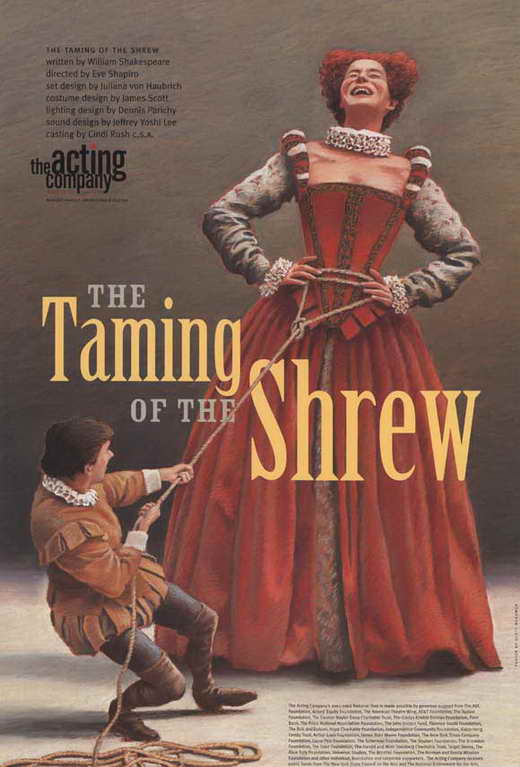 The Taming of the Shrew makes me, as it has made many readers over the years, deeply uncomfortable. The story of a woman (Katherina) being tamed by a man (Petruchio) so that she will become more docile and obedient is inherently repellent, and modern audiences are unsurprisingly ill at ease with sentiments such as these:
The Taming of the Shrew makes me, as it has made many readers over the years, deeply uncomfortable. The story of a woman (Katherina) being tamed by a man (Petruchio) so that she will become more docile and obedient is inherently repellent, and modern audiences are unsurprisingly ill at ease with sentiments such as these:PETRUCHIO: But for my bonny Kate, she must with me.
Nay, not look big, nor stamp, nor stare, nor fret;
I will be master of what is mine own.
She is my goods, my chattels; she is my house,
My household stuff, my field, my barn,
My horse, my ox, my ass, my anything.
I sincerely doubt that one could write a play in the 21st century in which a man calls his wife his "household stuff" and not be perceived as a villain. This is tempered somewhat by the undeniable fact that, like Benedict and Beatrice, Kate and Petruchio are well-matched for each other because they share an affinity for a kind of verbal (and physical) sparring as flirtation:
PETRUCHIO: Come, come, you wasp. I' faith, you are too angry.
KATHERINA: If I be waspish, best beware my sting.
PETRUCHIO: My remedy is then to pluck it out.
KATHERINA: Ay, if the fool could find it where it lies.
PETRUCHIO: Who knows not where a wasp does wear his sting?
KATHERINA: In his tongue.
PETRUCHIO: Whose tongue?
KATHERINA: Yours, if you talk of tales. And so farewell.
PETRUCHIO: What, with my tongue in your tail Nay, come again,
Good Kate. I am a gentleman.
Zing! It is clear to me that, despite Petruchio's mercenary intentions and Kate's unwillingness to be controlled, they have an affection for each other. (Kate, for example, seems to be genuinely upset when it seems as if Petruchio will leave her at the altar.) But try as I might I cannot close-read away the thought that Petruchio, who "tames" Kate by withholding food from her and keeping her from her family, is awfully cruel. Bloom sees a strong undercurrent of irony in Kate's final speech, in which she extols the virtue of submissiveness, and believes that The Shrew is actually the story of how Kate tames Petruchio by letting him think he's getting what he wants. If you can find that in here, let me know:
Such duty as the subject owes the prince,
Even such a woman oweth to her husband.
And when she is froward, peevish, sullen, sour,
And not obedient to his honest will,
What is she but a foul contending rebel
And graceless traitor to her loving lord?
This speech is so over the top that the temptation to read it as ironic is very strong, but it seems to me that treating earnestness as irony becomes an unwise critical loop by which we question whether anyone really believes anything. If Kate does not believe this, she has learned this lesson deeply and is too cunning to provide any wink to the audience.
Of course, Shakespeare never was a moralizer, and attempts to tease out the moral prescription of The Shrew are short-sighted. The feminists will find it to be feminist, and the misogynists will find it to be misogynist. As a comedy, it is not the best--too much time spent on the idiot romance between Kate's sister Bianca and the disguised Lucentio, for one--and I wonder if, had it been a greater play, such a question would have occupied us less.

1 comment:
This is pretty much exactly what I thought when I saw it performed a couple weeks ago. After seeing it, I read a little criticism, but I'm with you--I don't really see any evidence that the play is ironic, based on the text alone. I also agree that it falters when the focus isn't on Kate and Petruchio; he may treat her poorly but they still get the best lines in the play. I kept waiting for an inversion that never came.
Post a Comment